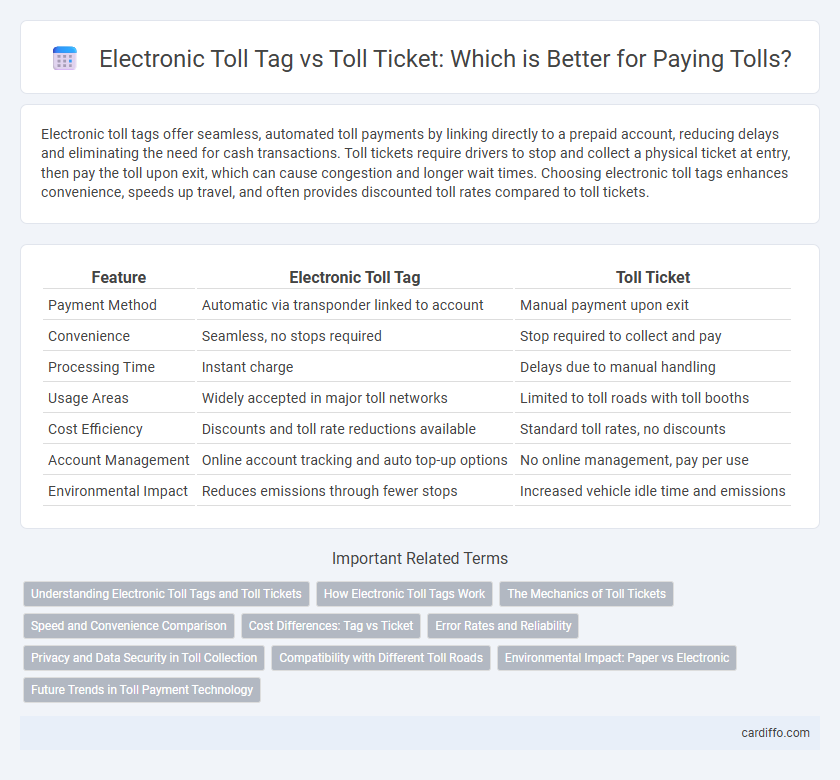Electronic toll tags offer seamless, automated toll payments by linking directly to a prepaid account, reducing delays and eliminating the need for cash transactions. Toll tickets require drivers to stop and collect a physical ticket at entry, then pay the toll upon exit, which can cause congestion and longer wait times. Choosing electronic toll tags enhances convenience, speeds up travel, and often provides discounted toll rates compared to toll tickets.
Table of Comparison
| Feature | Electronic Toll Tag | Toll Ticket |
|---|---|---|
| Payment Method | Automatic via transponder linked to account | Manual payment upon exit |
| Convenience | Seamless, no stops required | Stop required to collect and pay |
| Processing Time | Instant charge | Delays due to manual handling |
| Usage Areas | Widely accepted in major toll networks | Limited to toll roads with toll booths |
| Cost Efficiency | Discounts and toll rate reductions available | Standard toll rates, no discounts |
| Account Management | Online account tracking and auto top-up options | No online management, pay per use |
| Environmental Impact | Reduces emissions through fewer stops | Increased vehicle idle time and emissions |
Understanding Electronic Toll Tags and Toll Tickets
Electronic toll tags use RFID technology to automatically deduct toll fees as vehicles pass toll points, offering a seamless and efficient payment method. Toll tickets, in contrast, are paper-based slips issued at entry points, requiring manual payment based on distance traveled or specific toll zones. Electronic toll tags reduce congestion and enhance convenience by eliminating the need to stop, while toll tickets may involve longer processing times and potential delays at toll booths.
How Electronic Toll Tags Work
Electronic toll tags use RFID technology to communicate with toll plazas, enabling automatic vehicle identification and seamless toll payment without stopping. These tags are linked to an account that deducts toll fees instantly as vehicles pass through, enhancing efficiency and reducing traffic congestion. In contrast, toll tickets require manual collection and payment, which can lead to delays and increased operational costs.
The Mechanics of Toll Tickets
Toll tickets function by recording the entry point of a vehicle on a toll road, allowing the toll system to calculate the fee based on the distance traveled upon exit. This process requires drivers to collect a physical ticket at the toll plaza, which must be presented or scanned at the payment booth to determine the toll charge. Unlike electronic toll tags that use RFID technology for automatic detection and seamless payment, toll tickets rely on manual handling and can lead to delays or errors in toll assessment.
Speed and Convenience Comparison
Electronic toll tags enable seamless passage through toll plazas without stopping, significantly reducing travel time compared to toll tickets, which require manual payment and can cause delays. The instant processing of electronic toll tags eliminates queues and enhances convenience by automatically deducting toll fees from linked accounts. Drivers using electronic tags experience faster commutes and improved efficiency, making them the preferred choice for regular toll road users.
Cost Differences: Tag vs Ticket
Electronic toll tags generally offer lower costs per toll transaction compared to toll tickets, as tags often come with discounted rates and reduced service fees. Toll tickets, issued at toll plazas without pre-registration, usually include higher toll charges along with additional administrative fees for processing. Frequent drivers benefit financially from electronic toll tags by avoiding surcharges that increase overall toll expenses when using toll tickets.
Error Rates and Reliability
Electronic toll tags demonstrate significantly lower error rates compared to toll tickets, with accuracy levels exceeding 99.5%, reducing incorrect charges and improving payment efficiency. Toll tickets, often reliant on manual processing or license plate recognition, exhibit higher error rates due to image capture issues, misread characters, and delayed payments. Reliability of electronic toll tags is enhanced by real-time account management and seamless toll detection, whereas toll tickets face delays and disputes arising from processing errors.
Privacy and Data Security in Toll Collection
Electronic toll tags use encrypted wireless technology to securely transmit vehicle information, minimizing personal data exposure during toll collection. Toll tickets, which capture license plate images and require manual processing, pose higher risks of data breaches due to centralized storage and extended retention of personally identifiable information. Enhanced privacy protocols in electronic toll tags reduce unauthorized access, supporting compliance with data protection regulations in tolling systems.
Compatibility with Different Toll Roads
Electronic toll tags offer seamless compatibility with a wide range of toll roads, including express lanes, bridges, and tunnels, by enabling automatic payment without stopping. Toll tickets, however, are generally limited to specific toll plazas where paper-based transactions are processed, often requiring manual payment or ticket validation. This difference significantly affects travel convenience and speed, especially on multi-state or urban toll systems with diverse road network requirements.
Environmental Impact: Paper vs Electronic
Electronic toll tags significantly reduce environmental impact by eliminating the need for paper toll tickets, which contribute to deforestation and increased waste. The production, printing, and disposal of paper toll tickets generate carbon emissions and landfill waste, whereas electronic tags operate with minimal physical resources. Transitioning to electronic toll tags promotes sustainable transportation infrastructure by reducing resource consumption and lowering the carbon footprint associated with toll collection.
Future Trends in Toll Payment Technology
Electronic toll tags utilize RFID and automated vehicle identification for seamless, real-time toll collection, reducing congestion and enhancing traffic flow. Toll tickets, relying on manual or video-based recording, face limitations in scalability and efficiency as smart city infrastructure advances. Future trends emphasize integration of AI-driven analytics and blockchain for secure, transparent, and dynamic toll pricing models, pushing electronic toll tags into broader adoption.
Electronic toll tag vs toll ticket Infographic

 cardiffo.com
cardiffo.com